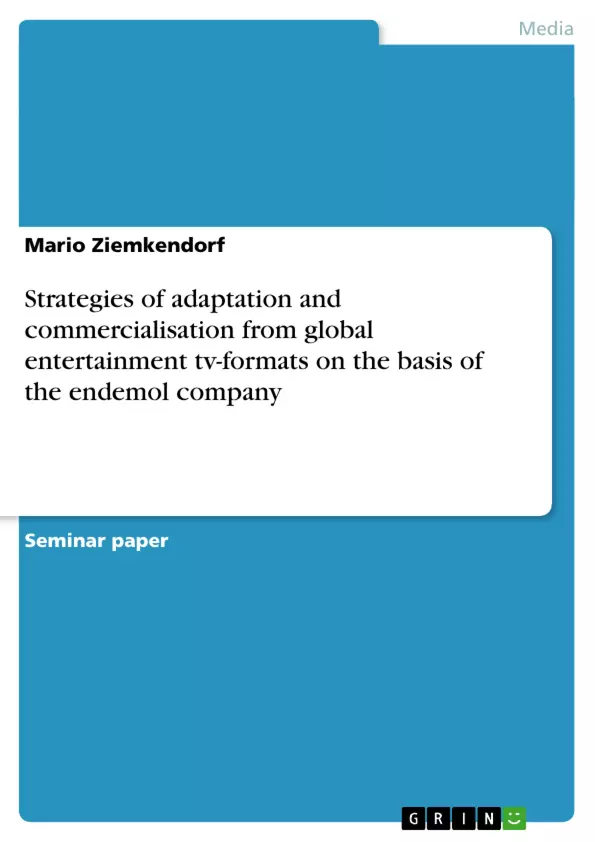Globalisation can be recognized in different areas of the society. In the course of globalisation the national television markets will cumulatively be linked with each other. According to this the world is also getting close in the television-area. Different companies are following different strategies with different success. In the discourse of globalisation the dominance of western culture and his consumer society are often criticized.
Another point are the tendencies of homogeneity of civilisations. These occur as a result of processes of standardization and lead to an affiliation of cultures. According to this, local traditions could be substituted step by step if the behavoiur of consumers and other fields of everyday occurrences adapt one another. The entertainment industry plays a special role in that context. It helps to develop and distribute the products in a commerical way especially in the fields of television, film, music, books and pc-games.
The entertainment industry applies as mediator from different kinds and different worlds of living (cf. Bundeszentrale für politische Bildung 2006, website). Entertainment programmes are meanwhile seen to be effective in popularity and attractiveness. They regularly achieve high viewing figures. Within the entertainment section the international trading with specific broadcasting programmes has risen a lot. Since the meaning of the international formattrading has risen, a well known reality format is “Big Brother” (distributed in 23 countries) (cf. Bundeszentrale für politische Bildung 2006, p. 9 and Hamilton/ Stevenson 2005, website).
The Inventor is the endemol company which plays an important role in connection to the formattrading business (cf. Endemol 2006 a, website). The big sucess of “Big Brother” and “Who wants to be a millionaire?” have pushed the international trade with tv-formats at the end of the nineties and paved the way for a top-selling class of business.
This termpaper discusses the global format trade in general and the strategies, that endemol is following to adapt tv-formats to local conditions.
In Addition to that, there will also be explained the different types of acquisition or rather production. In the following the format “Who wants to be a millionaire?” is used for explaining important and interesting facts about a tv-format with an international success. Finaylle a short conclusion and some critical aspects in connection with the format business conclude this term paper.
Inhaltsverzeichnis (Table of Contents)
- Introduction
- Global network of Endemol
- In-house production
- Commissioned production
- Acquisition
- Format-trading in general
- Take-over
- Format-adaption
- Indirect format-adaption
- Development of format-trading
- Importance and extent of format trade
- Strategies of Endemol
- Who wants to be a millionaire
- Endemol and "Who wants to be a millionaire?"
- International Appearance
- Regional Differences
- Difficulties of commercialisation
Zielsetzung und Themenschwerpunkte (Objectives and Key Themes)
This term paper explores the global format trade and the strategies used by Endemol to adapt television formats for local audiences. It specifically focuses on the production and acquisition processes, including in-house, commissioned, and acquired productions. The paper also examines the "Who wants to be a millionaire?" format, highlighting its international success and the challenges faced during commercialization. Key themes:- Global format trade and its impact on television markets
- Adaptation strategies for television formats across cultures
- Production and acquisition processes in the television industry
- The role of Endemol as a global leader in entertainment
- Commercialization strategies for international television formats
Zusammenfassung der Kapitel (Chapter Summaries)
Introduction
This section provides a brief overview of globalization and its impact on television markets, highlighting the rise of international format trading. It introduces Endemol as a major player in this field, emphasizing the success of formats like "Big Brother" and "Who wants to be a millionaire?" The chapter discusses the importance of economic capital and the role of the entertainment industry in cultural homogenization.Global Network of Endemol
This chapter describes Endemol's global network of subsidiaries, operating in 25 countries on five continents. It examines the benefits of this network, including shared resources, knowledge exchange, and local market expertise. The chapter also touches on the concept of "global players" and their role in cultural production.Types of Production
This section details different methods of acquiring television programs for broadcasting, focusing on three main types: in-house production, commissioned production, and acquisition. It explains the differences between these models and their advantages and disadvantages.Format-trading in General
This chapter defines format-trading as the exchange of television format licenses between licensers and licensees. It provides a definition of the term "format" and discusses the importance of adapting formats to local contexts.Who wants to be a millionaire?
This chapter focuses on the "Who wants to be a millionaire?" format, its international success, and the strategies Endemol used to adapt it for different regions. It also explores the challenges of commercializing such formats, considering cultural differences and market sensitivities.Schlüsselwörter (Keywords)
This paper explores key themes in global television format trade, specifically the strategies and adaptation processes used by Endemol. It analyzes the importance of production and acquisition methods, focusing on the "Who wants to be a millionaire?" format as a case study. Key terms include global format trade, adaptation strategies, Endemol, television production, acquisition, commercialization, international success, and cultural differences.- Quote paper
- Mario Ziemkendorf (Author), 2008, Strategies of adaptation and commercialisation from global entertainment tv-formats on the basis of the endemol company, Munich, GRIN Verlag, https://www.grin.com/document/114316




